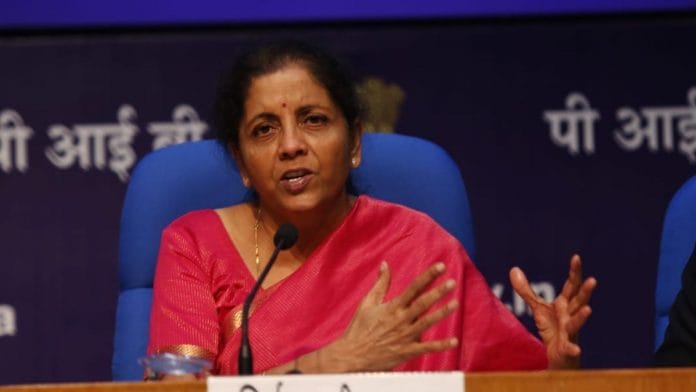New Delhi: India’s government unveiled a Rs 1.45 lakh crore plan that entails cutting tax on businesses to one of the lowest in Asia and supplements the central bank’s interest-rate reductions to bolster economic growth from a six-year-low.
Domestic companies will pay 22 per cent tax on their income from April 1, 2019, versus 30% previously, Finance Minister Nirmala Sitharaman said Friday. The effective rate, including all additional levies, will be 25.2 per cent and applicable on companies that aren’t availing any incentives or exemptions.
New companies formed from Oct. 1 will attract 15 per cent tax and an effective rate of 17.01 per cent, she said. That brings it to the same level as in Singapore.
The fiscal boost puts India’s tax rate on par with Asian peers and will spur efforts to attract companies looking for alternate manufacturing locations to escape disruptions from the U.S.-China trade war. The Rs 1.45 lakh crore ($20.5 billion) revenue loss from the move will test Sitharaman’s goal of narrowing the fiscal gap to 3.3% of gross domestic product this year despite a more than Rs 1.69 lakh crore ($24 billion) windfall from the Reserve Bank of India.
“We are conscious of the impact all this will have on our fiscal deficit,” Sitharaman said, without elaborating.
What Bloomberg’s Economists Say
“The tax cuts are likely to boost private investment and have the potential to attract much more foreign direct investment. Any fiscal slippage is likely to be limited in the near term, as stronger tax buoyancy will boost growth.”
— Abhishek Gupta, India economist
The government had estimated tax revenue of Rs 16.5 lakh crore in the year to March, and may now possibly revive plans for the nation’s maiden foreign currency sovereign bond sale.
The government’s growth support measures, announced in fits and starts over the last one month, supplement the RBI’s generous dose of monetary stimulus. Governor Shaktikanta Das, who called the tax cut a “bold move,” has led the rate-setting Monetary Policy Committee to deliver 110 basis points of easing this year, while signaling his readiness to do more amid stable inflation.
“We are in a state of coordinated policy response both by the government and the RBI,” said Madhavi Arora, an economist with Edelweiss Securities Pvt. in Mumbai. “Despite possible fiscal slippage, the RBI would likely deliver further cuts and continue to focus on policy transmission of earlier cuts.”
The Monetary Policy Committee is due to announce its next decision Oct. 4.
Big Bang
Several bankers and automakers said the move will help companies increase investment in the economy, where growth slowed to 5% in the quarter to June — the weakest pace since May 2013.
Reducing corporate tax rate to 25% is big bang reform. Allows Indian companies to compete with lower tax jurisdictions like the U.S. It signals that our government is committed to economic growth and supports legitimate tax abiding companies.A bold, progressive step forward.
— Uday Kotak (@udaykotak) September 20, 2019
The step will promote growth and investment, Sitharaman said, speaking from the western Indian city of Panaji.
India’s key S&P BSE Sensex rose 5.3 per cent in Mumbai, the biggest gain in a decade, and the rupee rallied after the announcement. Sovereign bonds slumped as fiscal concerns came sharply back to the fore.
The yield on the benchmark 10-year bond was up 17 basis points to 6.81 per cent, erasing a previous dip accrued after the central bank chief said there was scope for more easing.
Higher yields could make it tougher to rein in borrowing costs. Policy makers need to ensure that companies can borrow at competitive rates and must improve demand for the goods firms produce, said R. Shankar Raman, chief financial officer at Larsen & Toubro Ltd., India’s biggest engineering conglomerate.
“All of these need to fall in place for the investment rationale to be valid for providers of capital,” Raman said in a text message. “In all, a good beginning, albeit a year late.”
“The unexpected fiscal stimulus is positive for sentiment,” said Priyanka Kishore, head of India and south east Asia economics at Oxford Economics, Singapore. “Investors will watch closely on how the potential damage to the budget deficit is managed.” – Bloomberg
Also read: RBI Governor calls for market-led solution, dashes bailout hopes for struggling NBFCs







Modi backs RBI. .and the RBI backs FM and the FM backs PM and the circle is complete.